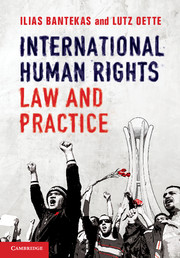Book contents
- Frontmatter
- Contents
- List of abbreviations
- Table of Cases
- Introduction
- 1 International human rights law and notions of human rights: foundations, achievements and challenges
- 2 International human rights law: the normative framework
- 3 Human rights in practice
- 4 The United Nations Charter system
- 5 The UN human rights treaty system
- 6 Regional human rights treaty systems
- 7 Individual complaints procedures
- 8 Civil and political rights
- 9 Economic, social and cultural rights
- 10 Group rights: self-determination, minorities and indigenous peoples
- 11 The human rights of women
- 12 The right to development, poverty and related rights
- 13 Victims’ rights and reparation
- 14 The application of human rights in armed conflict and the international criminalisation process
- 15 Human rights and counter-terrorism
- 16 Non-state actors and human rights
- 17 Globalisation and its impact on human rights
- Index
- References
12 - The right to development, poverty and related rights
- Frontmatter
- Contents
- List of abbreviations
- Table of Cases
- Introduction
- 1 International human rights law and notions of human rights: foundations, achievements and challenges
- 2 International human rights law: the normative framework
- 3 Human rights in practice
- 4 The United Nations Charter system
- 5 The UN human rights treaty system
- 6 Regional human rights treaty systems
- 7 Individual complaints procedures
- 8 Civil and political rights
- 9 Economic, social and cultural rights
- 10 Group rights: self-determination, minorities and indigenous peoples
- 11 The human rights of women
- 12 The right to development, poverty and related rights
- 13 Victims’ rights and reparation
- 14 The application of human rights in armed conflict and the international criminalisation process
- 15 Human rights and counter-terrorism
- 16 Non-state actors and human rights
- 17 Globalisation and its impact on human rights
- Index
- References
Summary
Introduction
Like self-determination and indigenous rights, the right to development is a collective entitlement. Yet, unlike its other counterparts, it was misunderstood for a long time because its very existence was erroneously associated solely with foreign aid and charity and it was not viewed through the lens of programmatic positive and negative obligations of the ailing states. As will be evident through the course of this chapter, development in its human rights context is primarily a value that translates into individual and communal well-being. This well-being may be linked to industrial or other financial development, although the correlation between the two is neither self-evident nor necessary. If this right to well-being is to make a difference in the lives of people, whether in poor or rich nations, it must be susceptible to quantifiable measurement with which one is able to assess its progress and realisation. In the last decade experts have come up with a list of detailed indicators which allow us to assess well-being more accurately. At the same time, wealthy nations have abandoned ad hoc unilateral efforts to assist their poorer neighbours to escape perpetual cycles of poverty by entering into institutionalised multilateral commitments to provide part of their annual earnings to developmental goals. These goals are also vigorously pursued by multilateral development banks, such as the World Bank and the African Development Bank. None the less, throughout this chapter the reader will come across a recurrent conflict between developmental goals aimed at augmenting the finances of poor nations, absent, however, a human rights approach to development based on the Bill of Rights.
- Type
- Chapter
- Information
- International Human Rights Law and Practice , pp. 484 - 521Publisher: Cambridge University PressPrint publication year: 2013
References
- 1
- Cited by



